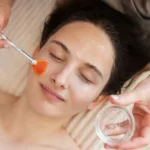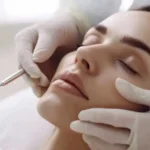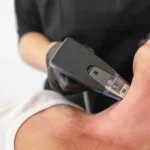Chemical peels are some of today’s modern approaches to skin rejuvenation. It is a popular cosmetic treatment that can improve the texture and appearance of the skin. They use chemical solutions to exfoliate the top layers of the skin, revealing smoother, more youthful-looking skin underneath.
Today, we will explore the science behind chemical peels and how they work to rejuvenate the skin. Read until the end and discover if chemical peels can work for you.
What is a Chemical Peel?
Chemical peels are skin treatments that use chemical solutions to remove the outer layers of the skin. The solution causes the skin to exfoliate and eventually peel off, revealing fresher, more even-toned skin. Practitioners can use chemical peels to treat a variety of skin concerns, including fine lines and wrinkles, acne, hyperpigmentation, and uneven skin tone.
How Chemical Peels Work
Chemical peels work their magic by removing the top layers of the skin, composed of dead skin cells and other debris. The chemical solution used in the peel penetrates the skin and breaks down the bonds between the dead skin cells, allowing them to be sloughed off. This process stimulates the growth of new skin cells, which can result in smoother, more even-toned skin.
There are several different types of chemical peels, each with its unique formulation and concentration of active ingredients. Some of the common ingredients used in chemical peels include alpha-hydroxy acids (AHAs), beta-hydroxy acids (BHAs), and trichloroacetic acid (TCA).
AHAs are water-soluble acids that are derived from fruits and milk. They break down the bonds between dead skin cells and promote cell turnover. AHAs are often used in lighter peels and are best suited for treating mild to moderate skin concerns.
BHAs are oil-soluble acids that are derived from salicylic acid. They are best suited for treating oily or acne-prone skin, as they penetrate deep into the pores to unclog them and reduce the appearance of blackheads and whiteheads.
TCA is a more vital acid that is often used in deeper peels. It works by causing the skin to clot, resulting in a crust that eventually peels off. TCA peels are best suited for treating more severe skin concerns, such as deep wrinkles, hyperpigmentation, and acne scars.
Newest Chemical Peel Innovations
Biorevitalization Peel
Simply put, a Biorevitalization Peel (PRX-T33) is a skin-tightening chemical peel without exfoliation. It is an improved formula of a trichloroacetic acid (TCA) peel. It is revolutionary because it does not visibly peel you but works on the deeper layers of the skin. It does not hurt, there is no downtime, and you can also go in the sun.
PRX-T33 is a non-peeling peel developed as a treatment for children with scars; it is revolutionary for correcting scars, stretch marks, and sagging skin. The PRX T33 peel also minimizes pores, eliminates old skin cells by improving cell turnover, and creates healthier, glowing skin.
This chemical peel is a perfect solution for those who do not want any downtime. The PRX T33 is not photo-sensitive. Therefore, limited sun exposure is unnecessary. Of course, SPF50 or higher is always required before going outside.
ZO Stimulator Peel
The ZO Stimulator Peel is the perfect “lunchtime” peel without downtime. This chemical peel is one of the milder peels, if not the softest. The peel contains three (3) different acids to exfoliate your skin and promote cell turnover, with 10% Salicylic Acid, 10% Lactic Acid and 10% Citric Acid. These are known as AHA or Alpha Hydroxy acids – they dissolve dead skin cells and give great exfoliation to the upper layers of the skin. You can repeat this peel frequently and ask experts how often you should do this peel.
SkinBetter Science AlphaRet Professional Peel System 30
A lighter skin peel for patients with mildly photodamaged skin, including early signs of skin aging and blemishes. AlphaRet, a patented technology that combines retinoid and alpha hydroxy acid (AHA), improves overall skin tone and texture and targets early signs of aging and blemishes. This chemical peel is ideal for patients with mild photodamage. Experts recommend 4-5 Skinbetter Peels for best results and glowing, healthy skin.
Benefits of Chemical Peels
Chemical peels offer a variety of benefits for the skin. They can improve the texture and appearance of the skin, reduce the appearance of fine lines and wrinkles, and even out skin tone. Experts can also use them to treat acne and reduce the appearance of acne scars. In addition, chemical peels can stimulate collagen production, improving the overall health and elasticity of the skin.
Do Chemical Peels Really Help Improve Healthy, Glowing Skin?
A chemical peel is a popular skin treatment that can help improve your skin’s health and appearance. Using a chemical solution to remove the outermost layers of dead skin cells can make chemical peels reveal fresh, healthy skin underneath.
One of the main benefits of chemical peels is that they can help reduce the appearance of fine lines, wrinkles, and other signs of aging. Through the growth stimulation of new skin cells, chemical peels can help smooth out rough or uneven skin texture, resulting in a more youthful and glowing complexion.
Chemical peels can also be effective at treating acne and other skin blemishes. By removing the outer layers of skin, chemical peels can help unclog pores and reduce inflammation, leading to more transparent and even-toned skin.
However, it’s important to note that chemical peels can be intense and unsuitable for everyone. Working with a qualified skin care professional who can assess your skin’s needs and recommend the best type of chemical peel for you is essential. With proper care and attention, chemical peels can help you achieve your desired healthy, glowing skin.
The Bottomline
Chemical peels are a safe and effective way to improve the appearance of the skin. They work by exfoliating the top layers of the skin, revealing smoother, more youthful-looking skin underneath. Chemical peels can be customized to treat a variety of skin concerns, and the results can last for several months. If you are considering a chemical peel, it is essential to consult with a qualified skincare professional to determine the best type of peel for your skin type and concerns.
Are you interested in experiencing chemical peels? Our great friends at Cultivated Beauty Aesthetic Boutique can help you today. Visit them now!









